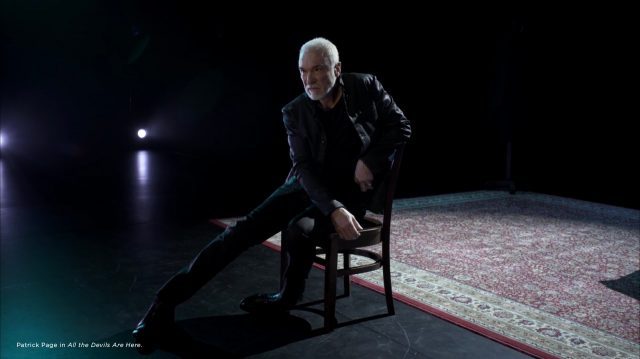
Patrick Page explores the history of villainy in Shakespeare’s plays in captivating one-man show for STC
Shakespeare Theatre Company
Available on demand, $25
www.shakespearetheatre.org
I can’t think of a better way to celebrate William Shakespeare’s 457th birthday — and honor the 405th anniversary of his death — by watching Patrick Page’s extraordinary one-man show, All the Devils Are Here: How Shakespeare Invented the Villain, in which the award-winning actor makes the case that no one has ever created bad guys quite like the Bard.
Shakespeare Theatre Company’s streaming presentation begins with an introduction by Page from his home, explaining why he wrote a play about scoundrels and malefactors. “My aim in doing so is to show how Shakespeare’s two-decade exploration of evil actually made him a more humane and sophisticated writer. In creating an entirely new kind of villain, Shakespeare rejected the prejudices of his age and became a writer for all of us.”
In the eighty-minute show, filmed at STC’s Sidney Harman Hall without an audience, Page traces the history of villains in the Bard’s plays chronologically, from 1590 to 1611, adding in a nod to a theatrical experience from young Will’s childhood. “Do you believe in evil spirits? Do you believe in evil? Did Shakespeare?” Page asks. “It’s an important question because Shakespeare, for all intents and purposes, invented the characters we now call the villain. You’ve likely seen Shakespeare’s influence everywhere and not even recognized it.”
Page, who is one of theater’s greatest Shakespearean actors and teachers, portrays Richard III, Sir John Falstaff from Henry IV, Part 2 (referring to him as “a walking compendium of the Seven Deadly Sins”), Malvolio from Twelfth Night, Claudius from Hamlet, Prospero from The Tempest, Lady Macbeth from Macbeth, and Iago from Othello, who he identifies as a sociopath. Talking about playing Iago in an STC production (opposite Avery Brooks), Page explains, “And so began a year of research and study that changed my view of my fellow human beings and opened my eyes to the reality of the evil hidden in plain sight all around us.” (Page has also played Macbeth, Claudius, Prospero, and Coriolanus at STC.)
Page compares the title character of Christopher Marlowe’s The Jew of Malta to Aaron the Moor from Titus Andronicus and does a deep dive into Shylock from The Merchant of Venice. “Shylock is the villain of the play,” he states. “But for the first time in history, he’s a villain whose motivation is so clear, whose psychology is so complex, and whose language is so rich and idiosyncratic that he changes the way we experience villainy itself.”
Directed by Alan Paul and shot by Ryan Risley, the play opens with Page walking onstage, looking out at an empty audience, an immediate reminder of the world’s current villain, the coronavirus, which has kept theaters closed for more than a year. Elizabeth A. Coco’s lighting is sharp and intense as Risley’s camera films Page from numerous angles, with appropriately ominous close-ups. Various props add further tension as well as comic relief; just wait until you see how Page portrays Falstaff. Gordon Nimmo-Smith’s sound design captures Page’s distinctive baritone as it resonates throughout the empty theater.

Patrick Page looks at the concept of evil in Shakespeare’s characters, including Richard III, in streaming presentation
Page knows what of he speaks; in addition to having portrayed his fair share of Shakespeare baddies, he has played Scar in The Lion King, Scrooge in A Christmas Carol, the Green Goblin in Spider-Man: Turn Off the Dark, Hades in Hadestown, and the Grinch in Dr. Seuss’s How the Grinch Stole Christmas, villains all in one form or another. His command of Shakespeare and the concept of evil is bold and impressive, but he is down-to-earth enough to throw in plenty of surprising modern-day pop-culture references to keep it fresh and relevant to those who might not know much about the Bard or Elizabethan theater. It’s a bravura performance that provides a much-needed level of comfort as theaters remain closed, albeit with legitimate hopes that they will be reopening in the very near future. In the meantime, we have Page and All the Devils Are Here to keep us company and scare the wits out of us, as he does with the following frightening excerpt from Macbeth:
“Make thick my blood. / Stop up the access and passage to remorse, / Let no compunctious visitings of nature / Shake my fell purpose, nor keep a peace between / The effect and it! Come, thick night, / and pall thee in the dunnest smoke of hell, / That my keen knife see not the wound it makes, / Nor heaven peep through the blanket of the dark / To cry ‘Hold, hold!’”